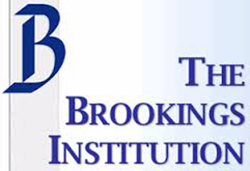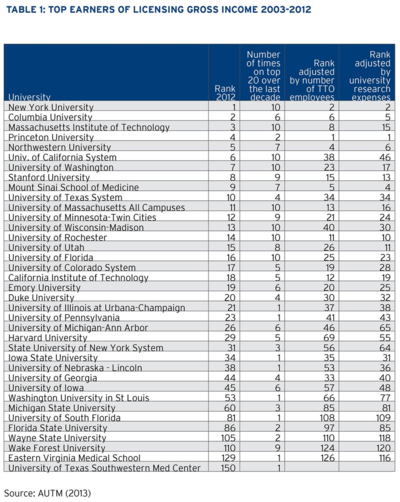 A paper released by the Center for Technology Innovation at the Brookings Institution asserts that by relying on a technology transfer model based on patent licensing, only a few universities have been able to generate significant revenues, and in fact, most university technology transfer offices do not generate enough income to even cover their operating expenses ("University Start-Ups: Critical for Improving Technology Transfer"). The paper, authored by Brookings fellow Walter D. Valdivia, instead favors a new model of technology transfer involving the creation of incentives and organizational capacity within universities to support the entrepreneurial efforts of faculty. The paper also proposes an expansion of funding for the Small Business Technology Transfer (STTR) program designating funds for university start-ups, Congressional authorization of a patent use exemption for non-profit research organizations for the purpose of exclusive experimental use, and that the executive branch empower federal agencies to use march-in rights provided under the Bayh-Dole Act to extend non-exclusive licenses for research tool patents that have been subjected to pricing excesses.
A paper released by the Center for Technology Innovation at the Brookings Institution asserts that by relying on a technology transfer model based on patent licensing, only a few universities have been able to generate significant revenues, and in fact, most university technology transfer offices do not generate enough income to even cover their operating expenses ("University Start-Ups: Critical for Improving Technology Transfer"). The paper, authored by Brookings fellow Walter D. Valdivia, instead favors a new model of technology transfer involving the creation of incentives and organizational capacity within universities to support the entrepreneurial efforts of faculty. The paper also proposes an expansion of funding for the Small Business Technology Transfer (STTR) program designating funds for university start-ups, Congressional authorization of a patent use exemption for non-profit research organizations for the purpose of exclusive experimental use, and that the executive branch empower federal agencies to use march-in rights provided under the Bayh-Dole Act to extend non-exclusive licenses for research tool patents that have been subjected to pricing excesses.
The paper explains that the Bayh-Dole Act created a uniform rule of patent ownership which made its transfer administratively efficient, and that to implement this policy, universities created small bureaucracies on their campuses -- technology transfer offices (TTOs) -- to manage their intellectual property. While only 30 universities had TTOs in 1979, the paper notes that two decades later the number of TTOs had grown to 174. Despite the rapid increase in their numbers, only a few TTOs raised significant income licensing their patents. As the paper points out, the top 5% of revenue-generating TTOs (8 universities) in 2012 collected 50% of the total licensing income of the university system, and the top 10% (16 universities) collected nearly three-quarters of the system's income. Moreover, because the top earning TTOs rely on blockbuster patents to generate licensing revenue, not surprisingly, the paper reports that the highest earners have become a select club with a stable membership. In particular, only 37 universities have been able to reach the top 20 of licensing revenue in any given year over the last decade (as shown in Table 1 from paper; click on image to enlarge):
 Because universities generally split licensing revenue equally among faculty-inventors, the departments or labs of the faculty-inventors, and the university, universities collect only one third of the licensing revenues raised by their TTOs while shouldering all of their operating costs. Thus, the paper states that "[i]t would be of little surprise to find out that the vast majority of university TTOs will function at an operational loss." In fact, an Association of University Technology Managers (AUTM) study reported that 130 of 155 universities surveyed indicted that they did not generate enough licensing revenue in 2012 to cover the wages of their technology transfer staff and the legal costs of the patents they file. The paper notes that over the past twenty years, 87% of TTOs did not break even.
Because universities generally split licensing revenue equally among faculty-inventors, the departments or labs of the faculty-inventors, and the university, universities collect only one third of the licensing revenues raised by their TTOs while shouldering all of their operating costs. Thus, the paper states that "[i]t would be of little surprise to find out that the vast majority of university TTOs will function at an operational loss." In fact, an Association of University Technology Managers (AUTM) study reported that 130 of 155 universities surveyed indicted that they did not generate enough licensing revenue in 2012 to cover the wages of their technology transfer staff and the legal costs of the patents they file. The paper notes that over the past twenty years, 87% of TTOs did not break even.
Instead of focusing on a technology transfer model based on patent licensing, which produces significant revenue for only a select group of universities, the paper proposes a new technology transfer model based on the creation of university start-ups. The paper explains that:
TTOs have realized that many university patents are embryonic applications and at that point only a small group of people, including the inventor, can understand the technical potential and even less the commercial potential. It is there where TTOs have spotted a business opportunity because they can provide services to faculty-inventors who want to pursue their ideas into commercial products but have little experience in starting up a firm. By "nurturing start-ups," TTOs can add the most economic value to an invention disclosure.
And as the paper notes, universities are making great strides in start-up creation. For example, while universities initiated 330 start-ups in 2003, the paper indicates that they initiated 647 in 2012.
In addition to moving the focus from licensing patents to creating start-ups, the paper also proposes some additional changes that would help nurture the technology transfer start-up model. Among these proposals is Congressional enactment of an experimental use exception. As the paper suggests, such an exception would "allow[] universities, laboratories, and other non-profit research centers to use patents for research and teaching purposes without risking infringement and with clear limits on ulterior commercial uses." The paper proposes that the exception extend to research conducted by start-ups up until the point that the start-up places a product in the market.
The paper concludes by stating that "[b]y nurturing start-ups, universities are taking on a more robust approach to technology transfer as they implicitly challenge the view that patents are the only or even the most important catalyst of university-industry cooperation," and declaring that while "[t]he innovation deficit will be closed by a sustained government commitment to foster innovation . . . greater emphasis must be placed on fostering the entrepreneurial spirit of universities."